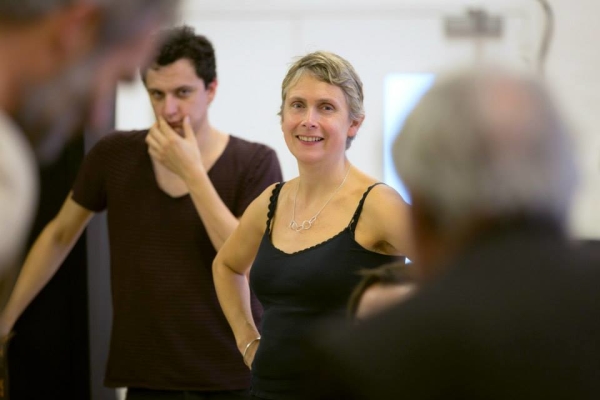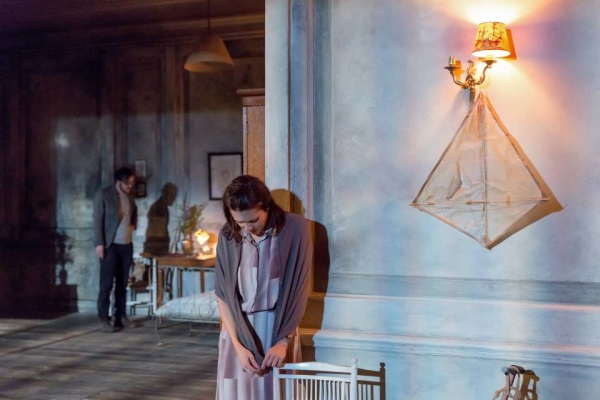Katie Mitchell talks Europe, climate change and honouring Chekhov's radicalism

© Stephen Cummiskey
There is an accepted narrative about the career of Katie Mitchell. The director, who spent the early years of her career with the Royal Shakespeare Company and has been an associate with both the Royal Court and the National Theatre, has supposedly been spurned by British theatre culture in recent years. Turned out by the critics, the story goes that Mitchell accepted creative exile in mainland Europe, honing her craft in line with the German tradition of 'director's theatre'. The word most frequently attached to her name is 'auteur', with more than a sniff of suspicious disdain.
"The thing that tends to get omitted from that narrative is the fact that I really enjoy working in Germany and France," says Mitchell, her laughter coloured with just a hint of exasperation. "Particularly to make theatre in Germany is an enormous honour, because it is one of the most cutting edge theatre cultures with an amazing stable of exceptional directors. To be welcomed into that stable is quite an honour."
Mitchell has been more than welcomed; on more than one occasion, her work has been selected for the prestigious Theatertreffen, the German theatre industry's annual showcase of the year's ten best productions. She tells me that she now spends around 60 percent of her year in Germany and France, where established relationships with artistic directors provide her with a steady stream of work. But for Mitchell, the theatre she continues to make in Britain is just as important.
"I don't always separate it in my head," she says. "To me it's just a body of work that I'm able to make across a lot of different organisations and countries and I feel really blessed."
In conversation, however, Mitchell repeatedly talks about Europe and Britain as separate entities. "That's really awful isn't it?" she suddenly interrupts herself, noticing her own habit. "The UK is supposed to be in Europe, but I don't experience it like that." The difference, she suggests, lies in a combination of cultural inheritance and audience expectations.
"It's just different traditions," Mitchell says, warning against the danger of assuming that the contrast comes down purely to different levels of state subsidy. "There can be narrative in Britain that the reason that German theatre is so wild and avant-garde is because of the amount of money that's thrown at it, and I don't think that's true. I think it's because that's the diet that audiences expect."
Mitchell is also wary of "a superficial following of the most easily available tropes like nudity, violence, blood, non-naturalism, white sets," insisting that German theatre encompasses a much wider set of aesthetics. "When I first went out I had maybe quite a superficial way of thinking about German theatre and over the last six or seven years I've found that my relationship to it has deepened and my respect for it has deepened."

© Stephen Cummiskey
Another neglected aspect of Mitchell's career trajectory is the team of artistic collaborators that she has built over the years. "In the mythologising of Katie in Europe, the thing that's omitted is the number of British artists that are coming out with me," she points out, mentioning the likes of lighting designer James Farncombe and sound designers Gareth Fry and Melanie Wilson. "It's a total team sport. I work with very large groups of creative colleagues and I couldn't function without them."
One such creative colleague is playwright Simon Stephens, with whom Mitchell has been working again on a new version of The Cherry Orchard at the Young Vic. Chekhov's last play is perhaps his most prescient, depicting an aristocracy and a culture on the brink of collapse. "We talked a lot about making a very new and modern version," Mitchell says of hers and Stephens' take on it. "That's translated into a production which is in contemporary costumes but not set explicitly now, and which is quite fast-moving and dark."
Mitchell is keen to stress that their interpretation is not tied to any particular time. Instead, her intention has been to highlight the play's timelessness and radical spirit. "The play was so radical in so many ways, both content and form, when it first came out, and I would really like to honour the gesture of Chekhov's radicalism," she says, suggesting that its status as a classic has a tendency to obscure this. "I just wanted to scrape that off like it was a barnacle on a rock; scrape that off and really honour the danger and the radicalism of the play as it would have been originally received."
To achieve that, Mitchell and Stephens have focused closely on the dynamics of class and the representation of Chekhov's female characters. "I would say the class politics are very sharp," says Mitchell, adding that "with the women, we've been very careful with their voices and the characterisation of them, so they are three dimensional and high IQ". As a feminist, this consideration is a vital element of all of Mitchell's work. "We're really careful about ways in which women are represented, even in plays by dead writers."
Mitchell's next project in the UK after The Cherry Orchard returns her to another of her greatest preoccupations: climate change. "It all comes back to having my first encounter with the scientist Stephen Emmott when I was at the National," she explains. This was a tipping point for Mitchell, after which she made a series of changes in her own life – she no longer flies, for example, instead travelling regularly across Europe by train – and vowed to create at least one piece of theatre a year that discusses the global threat of changes to our climate.
That promise led to Ten Billion, a show in partnership with Emmott at the Royal Court, and to her production of Duncan Macmillan's play Lungs for the Schaubuhne in Berlin, in which the lighting and sound was powered by onstage bikes. This year's offering is 2071, a new show at the Royal Court that follows in the vein of Ten Billion, but with some crucial differences. This time, Mitchell is working with climate scientist Chris Rapley and has also brought Macmillan on board as a co-writer.
"I thought that I could use some of my skills theatrically to offer scientists like Chris Rapley – who's one of the most important scientists alive now – a way of telling the narrative of climate change in lay person's terms," she explains, "so that people could absorb it, not despair, and take constructive action. That's the aim of this show. Ten Billion was on the darker end of the spectrum and tended to lead people to despair a lot. Although that's a useful stage, I think the show with Chris, because of Chris's personality and maybe his age, is going to be a show that acknowledges the complexity of how difficult it is even to receive the information, process it, and then convert it into something constructive. He's sort of optimistic – not about our ability to reverse what's happened, which we can't, but to mitigate it."
When Ten Billion was on at the Royal Court, a number of critics questioned whether its lecture format could really be considered theatre – and, indeed, if the distinction even mattered. "Of course it's theatre," is Mitchell's brisk, unequivocal response to such comments, seeing this attitude as a symptom of British theatre's narrow parameters when compared with the work she has encountered in Germany and France. Mitchell would love to see a widening of these parameters, arguing that "an allowing of different types of theatre-making is only healthy to a culture and a society".
"Who can say that? Who is the purveyor of the truth who can say that is theatre and that isn't theatre?" she asks. "If there were more types of theatre on the spectrum here, then maybe that comment wouldn't be made."
The Cherry Orchard opens at the Young Vic tonight (16 October). 2071 is at the Royal Court from 5 to 15 November.










